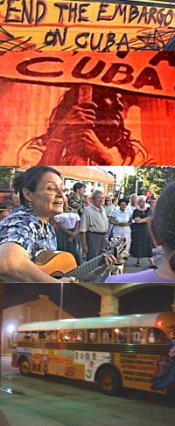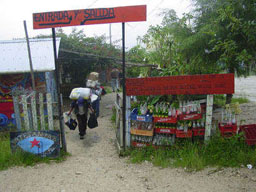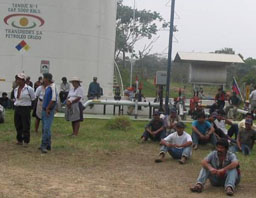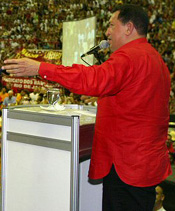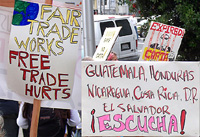Feature Archives
Fri Jul 22 2005
Pastors for Peace Caravan Detained At US Border
7/22/2005
130 US citizens crossed the US/Mexico border just before daybreak with almost all of the 140 tons of humanitarian aid en route to Cuba and collected by the Pastors for Peace Friendshipment Cuba Caravan.
6 buses filled aid and caravan members will move forward on the journey and 1 bus with aid and computers was ordered to stay. Photos
7/21/2005 The Pastors for Peace Friend shipment Caravan to Cuba were released, but the struggle is not over. Kathryn Hall and at least two buses are now in Hidalgo, TX, 6 buses and 2 trucks were not released.
7/21/2005 Participants in the 16th Annual Friendship Caravan to Cuba are being held in McAllen Texas at the borders between Mexico and Texas by US Homeland Security Officers, and the Commerce Department. They have been stopped and surrounded and by United States’ Homeland Security Officers, who are preventing them from traveling through Mexico to Cuba. Among those being held is Kathryn Hall, the executive director of the Sacramento Center for Community Health and Well Being.
7/18/2005 The 16th US/Cuba Friendshipment Caravan, organized by IFCO/Pastors for Peace, is preparing to launch a new challenge against the US economic blockade of Cuba. 150 participants – from the US as well as from Mexico, Canada, Uganda, nine European countries, and the Caribbean – are currently gathering in McAllen, Texas. Seven large yellow buses, one small bus, and two box trucks, all of them brightly painted, as well as several other smaller vehicles, all of them filled with valuable humanitarian aid, make up the Pastors for Peace caravan, which has stopped in 130 cities in all parts of the US and will soon be on its way through Mexico to Cuba.
As in previous years, the caravan is carrying nearly 150 tons of humanitarian aid for Cuba – hospital equipment such as incubators, EKG and X-ray machines, dental chairs, medical supplies, computers, school supplies, and urgently needed relief aid for the recent victims of Hurricane Dennis.
Read More With Audio
7/10/05 The Pastors for Peace Caravan stopped in Fresno Announcement | Video.
7/6/05 A Pastors for Peace Caravan to Cuba bus was parked at Santa Cruz's weekly farmer's market. Amigos de Cuba (Friends of Cuba), Santa Cruz County, spoke with many people about the Cuban Five and the US embargo on Cuba. Photos at SC-IMC.
In 1993, U.S. Treasury officials at the Laredo, Texas, border seized a Friendshipment school bus, claiming Fidel Castro might use it as a military vehicle. Thirteen people on board at the time began a hunger strike that provoked an international mobilization and demonstrations in 20 U.S. cities. The bus was released after the fast and related campaign that lasted 23 days. Walker and four others went without food for over 90 days in 1996 to force the U.S. government to release 420 donated computers destined for Cuba’s health network and educational system. Read More
7/21/2005 The Pastors for Peace Friend shipment Caravan to Cuba were released, but the struggle is not over. Kathryn Hall and at least two buses are now in Hidalgo, TX, 6 buses and 2 trucks were not released.
7/21/2005 Participants in the 16th Annual Friendship Caravan to Cuba are being held in McAllen Texas at the borders between Mexico and Texas by US Homeland Security Officers, and the Commerce Department. They have been stopped and surrounded and by United States’ Homeland Security Officers, who are preventing them from traveling through Mexico to Cuba. Among those being held is Kathryn Hall, the executive director of the Sacramento Center for Community Health and Well Being.
7/18/2005 The 16th US/Cuba Friendshipment Caravan, organized by IFCO/Pastors for Peace, is preparing to launch a new challenge against the US economic blockade of Cuba. 150 participants – from the US as well as from Mexico, Canada, Uganda, nine European countries, and the Caribbean – are currently gathering in McAllen, Texas. Seven large yellow buses, one small bus, and two box trucks, all of them brightly painted, as well as several other smaller vehicles, all of them filled with valuable humanitarian aid, make up the Pastors for Peace caravan, which has stopped in 130 cities in all parts of the US and will soon be on its way through Mexico to Cuba.
As in previous years, the caravan is carrying nearly 150 tons of humanitarian aid for Cuba – hospital equipment such as incubators, EKG and X-ray machines, dental chairs, medical supplies, computers, school supplies, and urgently needed relief aid for the recent victims of Hurricane Dennis.
Read More With Audio
7/10/05 The Pastors for Peace Caravan stopped in Fresno Announcement | Video.
7/6/05 A Pastors for Peace Caravan to Cuba bus was parked at Santa Cruz's weekly farmer's market. Amigos de Cuba (Friends of Cuba), Santa Cruz County, spoke with many people about the Cuban Five and the US embargo on Cuba. Photos at SC-IMC.
In 1993, U.S. Treasury officials at the Laredo, Texas, border seized a Friendshipment school bus, claiming Fidel Castro might use it as a military vehicle. Thirteen people on board at the time began a hunger strike that provoked an international mobilization and demonstrations in 20 U.S. cities. The bus was released after the fast and related campaign that lasted 23 days. Walker and four others went without food for over 90 days in 1996 to force the U.S. government to release 420 donated computers destined for Cuba’s health network and educational system. Read More
Mon Jul 11 2005
Memories of the Looting
Ali Tonak, in the June issue of Fault Lines, writes:
Legendary Argentinean filmmaker Fernando E. Solanas' latest film, A Social Genocide, had its U.S. premiere at the 48th San Francisco International Film Festival. The 2001 collapse of the Argentinean economy and the following resistance, organized horizontally through assemblies in the streets, in the workplace and in the neighborhoods, captured the imagination of global justice activists around the world. San Francisco, being a historic epicenter of various incarnations of anti-capitalism activism, packed the sold-out theater.
Legendary Argentinean filmmaker Fernando E. Solanas' latest film, A Social Genocide, had its U.S. premiere at the 48th San Francisco International Film Festival. The 2001 collapse of the Argentinean economy and the following resistance, organized horizontally through assemblies in the streets, in the workplace and in the neighborhoods, captured the imagination of global justice activists around the world. San Francisco, being a historic epicenter of various incarnations of anti-capitalism activism, packed the sold-out theater.
Solanas' film is a deeply personal poetic reflection of the history of the neoliberal ransacking of the Argentinean economy. The Spanish title, Memorias del Saque, literally translates into “Memories of the Ransacking”. This title carries a double meaning as the film begins and ends with the ransacking of the supermarkets by a population robbed by generations of neoliberals.
Wed Jun 22 2005
Zapatistas on "Red Alert" in Chiapas
Perhaps in response to the mobilization of 70,000 Mexican army troops in Chiapas, the EZLN has gone on "red alert" and
Zapatista governments are now operating clandestinely. The Mexican Secretary of Defense recently attempted to claim that Zapatistas were involved in narco cultivation and trafficking, but it has since come to light that the towns where marijuana plants were allegedly found are not under rebel control; on the other hand previous Mexican administrations have been caught 12 times attempting to plant contraband drugs in Zapatista territory. A June 20th Zapatista communique stated that the centers of Good Government throughout Chiapas had been closed because all Zapatistas have been called to a consultation about what steps to take. Alerta Roja en español | War may resume | Red Alert communique and interview from La Jornada | Report by Narconews | Indymedia Chiapas
Wed Jun 8 2005
Massive Demonstrations in Bolivia Continue, Demanding Closure of Parliament and Nationalization of Oil and Gas
Bolivia, 6/8/2005: Into the 4th week of fierce mobilizations and nationwide blockades, the popular social movements of Bolivia have demonstrated a deep distrust of the political structure and unwavering strength of purpose in their demands.
President Carlos Mesa resigned on June 6 under heavy pressure to nationalize hydrocarbons; U.S. Ambassador Greenlee has reportedly fled with his family. "We will continue working so that we have participation in the government, because otherwise, we are always going to work for others and that must change...someday we must be the government. Neither with the resignation of Mesa nor with elections will the problems be solved," says Abel Mamani, Aymara leader of the El Alto Federation of Neighborhood Committees (FEJUVE). In 2003, the FEJUVE lead the fight to overthrow Gonzalo Sanchez de Losada, who had privatized strategic companies.
 Yesterday's street battles left 12 wounded, with 2 in the operating room of the General Hospital of La Paz. The police seized 1000 dynamite charges. 4 farmers were also wounded. People raised barricades in the streets bordering the San Francisco Plaza. Thousands of miners and indigenas faced several hours of intense tear gas from the police yesterday. From San Francisco Plaza to the Prado (main street) a white cloud covers the bordering avenue and streets, according to journalists.
Yesterday's street battles left 12 wounded, with 2 in the operating room of the General Hospital of La Paz. The police seized 1000 dynamite charges. 4 farmers were also wounded. People raised barricades in the streets bordering the San Francisco Plaza. Thousands of miners and indigenas faced several hours of intense tear gas from the police yesterday. From San Francisco Plaza to the Prado (main street) a white cloud covers the bordering avenue and streets, according to journalists.
Traditional parties are hoping for the presidential succession of Diez Vaca, the "man" of the transnational companies and Santa Cruz oligarchy, where the natural gas resources are located. International solidarity with the fight of the people of Bolivia has been requested. Live radio | Reports: 1 | 2 | 3 | 4 | 5 | Read more at Zmag, Counterpunch and Narconews | Photos at Indymedia Bolivia
 Yesterday's street battles left 12 wounded, with 2 in the operating room of the General Hospital of La Paz. The police seized 1000 dynamite charges. 4 farmers were also wounded. People raised barricades in the streets bordering the San Francisco Plaza. Thousands of miners and indigenas faced several hours of intense tear gas from the police yesterday. From San Francisco Plaza to the Prado (main street) a white cloud covers the bordering avenue and streets, according to journalists.
Yesterday's street battles left 12 wounded, with 2 in the operating room of the General Hospital of La Paz. The police seized 1000 dynamite charges. 4 farmers were also wounded. People raised barricades in the streets bordering the San Francisco Plaza. Thousands of miners and indigenas faced several hours of intense tear gas from the police yesterday. From San Francisco Plaza to the Prado (main street) a white cloud covers the bordering avenue and streets, according to journalists.
Traditional parties are hoping for the presidential succession of Diez Vaca, the "man" of the transnational companies and Santa Cruz oligarchy, where the natural gas resources are located. International solidarity with the fight of the people of Bolivia has been requested. Live radio | Reports: 1 | 2 | 3 | 4 | 5 | Read more at Zmag, Counterpunch and Narconews | Photos at Indymedia Bolivia
Two events are being held in the Bay Area this week as part of an ongoing campaign to allow Assata Shakur to live in exile in Cuba free from U.S. harassment, and to demand that the US government extradite Luis Posada Carriles to Venezuela. A demonstration/press conference was held on Friday, June 3rd at 12 Noon at the Oakland Federal Building ( Video | Audio ). An Educational Program will be held on Saturday, June 4th, at Oaklandish, 411 2nd St. (Near Jack London Square), in Oakland. Saturday night's event will include clips from the videos "Eyes of the Rainbow" and "Posada's
Victims Families Demand Justice."
On May 2nd the Federal Bureau of Investigation (FBI) put a $1 million bounty on the head of Assata Shakur and placed her on the domestic terrorist list under the Patriot Act under her former name, Joanne Chesimard. Assata is a former member of the Black Panther Party and the Black Liberation Army who was falsely accused of murdering a New Jersey State Trooper on May 2nd, 1973. In 1979 Assata escaped prison and was given political sanctuary in Cuba.
Assata's supporters say that the aim of the FBI's attack on Assata is to eliminate the domestic resistance of the Black Liberation movement, undermine the sovereignty of Cuba and Venezuela, and set the stage for the possible invasion of these two nations. They believe that the FBI escalation at this time is also meant to divert attention from Luis Posada Carriles, an anti-Cuban terrorist wanted by Venezuela on charges of blowing up a Cuban airliner, who recently came to the United States seeking political asylum. Read more
The ANSWER Coalition is planning for a June 13th National Day of Action to demand that the US extradite Posada to Venezuela. The protest in San Francisco will be at 12noon at the federal courthouse at 7th and Mission Streets.
Hands Off Assata Website | Hands Off Cuba Campaign | Assata Shakur Speaks
On May 2nd the Federal Bureau of Investigation (FBI) put a $1 million bounty on the head of Assata Shakur and placed her on the domestic terrorist list under the Patriot Act under her former name, Joanne Chesimard. Assata is a former member of the Black Panther Party and the Black Liberation Army who was falsely accused of murdering a New Jersey State Trooper on May 2nd, 1973. In 1979 Assata escaped prison and was given political sanctuary in Cuba.
Assata's supporters say that the aim of the FBI's attack on Assata is to eliminate the domestic resistance of the Black Liberation movement, undermine the sovereignty of Cuba and Venezuela, and set the stage for the possible invasion of these two nations. They believe that the FBI escalation at this time is also meant to divert attention from Luis Posada Carriles, an anti-Cuban terrorist wanted by Venezuela on charges of blowing up a Cuban airliner, who recently came to the United States seeking political asylum. Read more
The ANSWER Coalition is planning for a June 13th National Day of Action to demand that the US extradite Posada to Venezuela. The protest in San Francisco will be at 12noon at the federal courthouse at 7th and Mission Streets.
Hands Off Assata Website | Hands Off Cuba Campaign | Assata Shakur Speaks
Tue May 31 2005
Upcoming Hands Off Venezuela Meeting in San Francisco
The Hands Off Venezuela Campaign has started meeting in San Francisco to try and raise awareness about the inspiring events in Venezuela and to organize against the threats against them from the US government. Two years after the unsuccessful military coup against the democratically elected government of Venezuela, headed by President Hugo Chavez, the US still appears to be threatening the Venezuelan government. Many US representatives, including Condoleezza Rice, have called Chavez a "negative force" in the region. Hands Off Venezuela says, "The underlying motivation of the US government is clear: the Chavez government has been shifting the benefits from the country's oil wealth from the rich giant corporations to the vast majority of the population by providing food, housing, health care and education... we believe it is vitally necessary for all those in the US and around the world to affirm Venezuela's right to determine its own destiny by joining forces to forge a resistance to the US government's aggressive aims."
San Francisco Bay Area Hands Off Venezuela will hold its next meeting on Thursday, June 9th, at 7pm in Centro del Pueblo's auditorium, at 474 Valencia St in San Francisco. At the meeting, a report on recent developments by Sonia Zerpa, a resident of Caracas, Venezuela will be presented. Read more
Hands Off Venezuela | Venezuela News & Action email newsletter
San Francisco Bay Area Hands Off Venezuela will hold its next meeting on Thursday, June 9th, at 7pm in Centro del Pueblo's auditorium, at 474 Valencia St in San Francisco. At the meeting, a report on recent developments by Sonia Zerpa, a resident of Caracas, Venezuela will be presented. Read more
Hands Off Venezuela | Venezuela News & Action email newsletter
Sat May 28 2005
Bay Area Continues to Oppose CAFTA
Members of the Stop Cafta Coalition held a rally and press conference May 11th, 2005, at 870 Market St., the San Francisco consulate offices for most Central American countries. Photos Presidents from Central America were visiting the U.S. to lobby Congress to vote in favor of CAFTA. Speakers at the rally emphasized how the majority of people in Central America are opposed to CAFTA, despite what their presidents say. The Central American Free Trade Agreement (CAFTA also known as DR-CAFTA) would create a trade and investment bloc that includes Costa Rica, El Salvador, Guatemala, Honduras, Nicaragua, the Dominican Republic, and the United States.
San Francisco Bay Area groups demonstrated at House Minority Leader Nancy Pelosi's office in the Federal Building in San Francisco May 26th urging Congress not to pass CAFTA. Photos Two days later, May 28th, when President Bush signed the agreement, she stated her opposition: "The countries of Central America have inadequate, poorly-enforced labor and environmental laws that do not follow international standards. As such, enforcement in these areas must be written into CAFTA rather than just asking the countries to police themselves." CAFTA must be ratified by majority vote of both houses before it would go into effect.
Anti-CAFTA activists report that the Republican leadership is pushing to introduce CAFTA in June. They have called May 28: "A Bitter Birthday for Bush's CAFTA Bill." It has been a year since CAFTA was signed, and a nationwide movement against CAFTA has made it so the Administration hasn't been able to get the votes it needs to pass it in Congress. Senate Finance Committee Chairman Charles Grassley (R-IA) has indicated that the Committee is tentatively considering a "mock markup" of CAFTA for June 14, 2005. Anti-CAFTA organizers believe that if the US realizes that there aren't enough votes to pass CAFTA, it may never come up for a vote. However, not all representatives' planned votes are known. The Stop CAFTA Coalition is encouraging people to meet with their senators or representatives during the Memorial Day recess or to hold protests to get their concerns heard. More info on the Stop CAFTA Website and the CISPES website.
San Francisco Bay Area groups demonstrated at House Minority Leader Nancy Pelosi's office in the Federal Building in San Francisco May 26th urging Congress not to pass CAFTA. Photos Two days later, May 28th, when President Bush signed the agreement, she stated her opposition: "The countries of Central America have inadequate, poorly-enforced labor and environmental laws that do not follow international standards. As such, enforcement in these areas must be written into CAFTA rather than just asking the countries to police themselves." CAFTA must be ratified by majority vote of both houses before it would go into effect.
Anti-CAFTA activists report that the Republican leadership is pushing to introduce CAFTA in June. They have called May 28: "A Bitter Birthday for Bush's CAFTA Bill." It has been a year since CAFTA was signed, and a nationwide movement against CAFTA has made it so the Administration hasn't been able to get the votes it needs to pass it in Congress. Senate Finance Committee Chairman Charles Grassley (R-IA) has indicated that the Committee is tentatively considering a "mock markup" of CAFTA for June 14, 2005. Anti-CAFTA organizers believe that if the US realizes that there aren't enough votes to pass CAFTA, it may never come up for a vote. However, not all representatives' planned votes are known. The Stop CAFTA Coalition is encouraging people to meet with their senators or representatives during the Memorial Day recess or to hold protests to get their concerns heard. More info on the Stop CAFTA Website and the CISPES website.
Americas:
 23
23



